When it comes to gaining size, I don't prioritize any one macronutrient over another or consume any of them in significantly greater quantities than the next. Carbohydrates, proteins, and fats are all crucial for putting on mass. There are many bodybuilding foods that can satisfy your macronutrient and calorie requirements, but I recommend focusing on these 12.
What may sound good in theory doesn't always work best in application—and could cost you gains. For example, traditional wisdom held that bodybuilders should skip the white rice and eat brown rice, shy away from white potatoes in favor of yams, and eat egg whites instead of whole eggs to avoid the cholesterol; however, anyone who has ever eaten for maximum size will tell you that brown rice can fill you up too much, eating too many yams can give you gas and make you bloated, and avoiding egg yolks and going for the whites is like throwing away a barbell but keeping the plates.
Here are the top 12 foods that have worked best for me. Use the list as a starting point as you discover the foods that give you the results you want.
1. Beef
Red meat has always been hailed as the king of muscle-building foods, and that isn't wrong. Beef is rich in creatine, B-vitamins, and saturated fats, so you may wonder why you shouldn't just supplement with lean proteins, take some creatine, rely on the B-vitamins in your multi, and call it a day. From my experience with eating red meat on a daily basis, I can tell you that I'm bigger, stronger, and fuller than when I don't. It just works.
2. Whole Eggs
It's unfortunate that we're still undoing the stigma around eggs that popped up in the 1980s. People claimed that whole eggs, because of their high cholesterol content, should be severely limited or scrapped altogether in favor of egg whites. This was terrible advice.
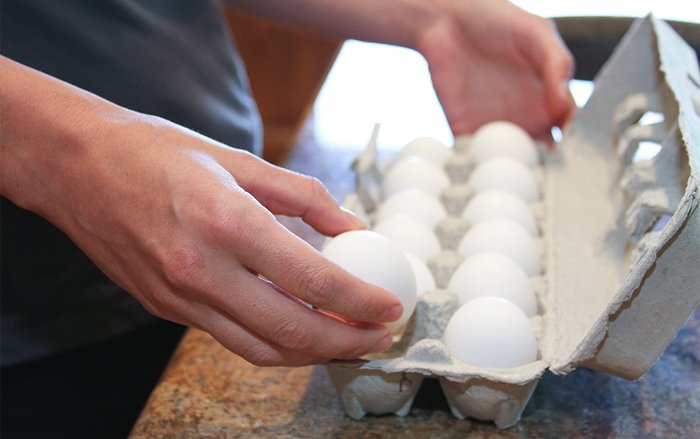
Cholesterol actually serves as the basis for other steroid hormones like testosterone. What's more, egg whites are not as high in protein as whole eggs and the yolks contain nutrients such as choline which is great for your nervous system—don't forget muscle contractions happen only via nerve impulses.
The whole egg—not just the egg white—is considered the gold standard for both biological value and protein utilization. Most people experience digestive issues when consuming large amounts of egg whites, but very few get an upset stomach when they eat whole eggs.
3. Chicken
Chicken is a mainstay in nearly every bodybuilder's diet, and for good reason. Compared to all other protein sources, it is easily the most economical. You can still find chicken breast on sale for around $2 per pound. It may not be as easy on the digestive system as lean fish, but it's certainly easier to digest than beef and at a fraction of the price. Also, as you're probably well aware, chicken breast is almost all protein and very little fat, yet it still tastes decent and lends itself to a variety of preparations.
4. Fish
While fish may lack the hardcore and somewhat legendary muscle-building status that red meat has, it can be a powerhouse when used properly. The one thing that each and every one of us will eventually come to terms with in our attempts to build the maximum amount of muscle is that we can only eat so much damn food. At some point, our aspirations will demand that we eat more. That sounds great, until eating more begins to feel nauseating and impossible.
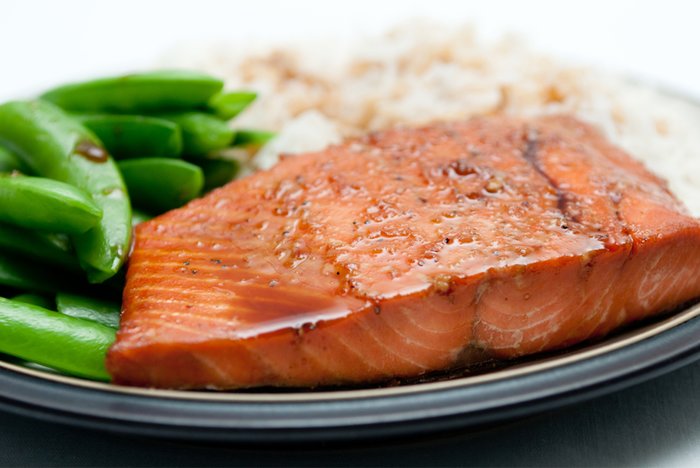
Although you can go the force-feeding route, the smart play is to look at your diet and realize where digestive inefficiency might be preventing you from consuming a greater volume of food. When you begin eating foods that digest faster and more easily, you suddenly find yourself able to eat more food more often. For me, there is no protein that goes down or digests more easily than lean, flaky white fish. Hell, you barely have to chew it, which is great because I personally get sick of all the damn chewing.
5. White Rice
Conventional wisdom says to eat brown rice because it has more fiber and vitamins. I think that's all crap. Most carbohydrates are a poor source of vitamins and minerals compared to meat and vegetables. Eating too many fibrous carbohydrates will only slow digestion and fill you up more, preventing you from eating to your full capacity.
If you're looking to control your appetite and slow your digestion, opting for fibrous starch sources can be a good strategy, but when you're looking to grow and eat excess calories, it's rarely the best option.
White rice is one of the best carb sources out there because it's cheap, easy to prepare, hypoallergenic, and digests like a dream. A cup of white rice yields 45 grams of carbohydrates, and you can practically inhale it. Two thumbs-up.
6. Potatoes
Let's continue with the theme of digestive efficiency. I love potatoes for the same reasons I love white rice—they digest incredibly well. There is not much of a difference between white and sweet potatoes, so both are acceptable. It's simply not true that sweet potatoes will somehow lead to ripped abs while white potatoes are made in hell and are a one-way ticket to obesity.
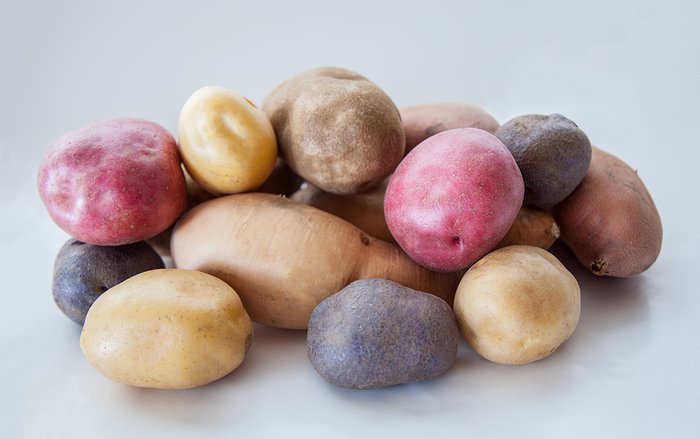
Potatoes are a good source of starchy carbohydrates and are also gluten free. Even if you don't suffer from celiac disease, you can experience digestive upset after the overconsumption of gluten-containing carbohydrates. You don't have to steer clear of bread or pasta altogether, just don't make them your staples.
Make gluten-free carbs such as rice and potatoes the foundation of your carbohydrate intake to digest efficiently and keep your total food intake as high as possible.
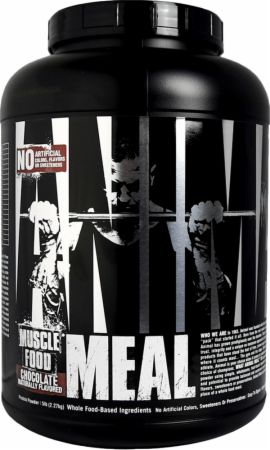
7. Olive Oil
While bodybuilders of the past may have avoided fats due to the widespread notion that "fat makes you fat," today's bodybuilders are embracing healthy fats as an essential, calorie-dense component of a balanced diet. Try attaining your maximum size on a low-fat diet, then try a diet rich in quality fats and tell me which worked better.
Not only does it make no sense to limit yourself to two of the three macros, but you will find yourself able to eat only so much protein and carbs day in and day out. As bodybuilders, we should acknowledge that fat is the only macro sporting 9 calories per gram versus the 4 calories per gram contained in proteins and carbohydrates. When stomach real estate is limited, we can really appreciate the caloric potency of fats.
Fat doesn't get any purer or more easily digested than a good oil. A mere tablespoon of oil will give you 120 calories by way of 14 grams of fat. Olive oil is a cost-effective option that tastes good and is rich in monounsaturated fat, which means that the fats in olive oil are more likely to remain stable and less likely to turn rancid. It also means that the fats in olive oil will provide you with a steady source of usable energy and convert well to usable omega-3s in the body.
8. Avocados
No one will dispute that avocados are a nutritional powerhouse. They're loaded with vitamins, minerals, and lots of healthy fats. One medium Hass avocado provides approximately 30 grams of fat, more than 300 calories, and shocking amounts of micronutrients.
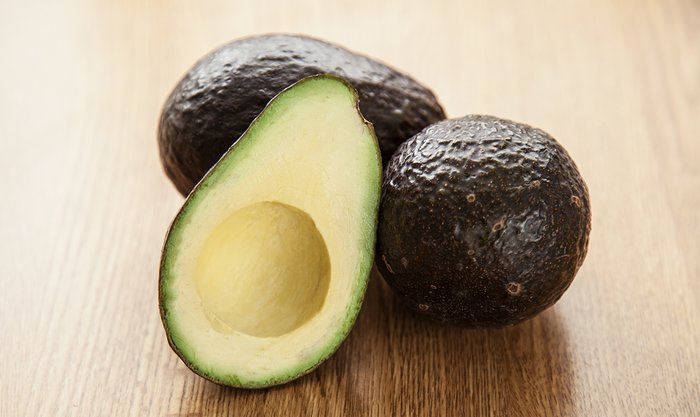
Avocados are also heavy in fiber, however—about 15 grams per avocado—and while that may sound great, many people are sensitive to getting too much fiber at once. Again, large doses can decrease appetite, which keeps you from consuming the necessary volume of food. On the other hand, if you do well with avocados, I highly recommend including them in your quest for size.
9. Nuts
Like avocados, nuts are a nutritious food source with an abundance of vitamins, minerals, and healthy fats. Even though peanuts are not technically nuts, they are nutritionally equal to different types of nuts and seem to do an excellent job of helping people put on weight. Plus, peanuts, like most nuts, are delicious and easy to eat in large quantities. Don't shy away from them!
10. Full-Fat Dairy
Milk promotes growth like nothing else can, especially full-fat milk. I successfully used milk and cottage cheese as dietary staples when I was gaining size as a young aspiring bodybuilder. Unfortunately, milk-based dairy products no longer digest well for me, so I exclude them from my diet now. You should too if dairy bothers you, but if it doesn't, I would absolutely encourage you to include dairy in your diet.
11. Meal Replacement Powders
I'll be the first to admit that whole foods are king. You simply cannot improve upon the workings of mother nature with a man-made product. The ideal scenario is to be able to sit down to a well-balanced meal of fresh food every time you need to eat, but you don't always find yourself in that ideal scenario. Travel, work, and being on the go or pressed for time can put a proper whole-food meal out of reach.

It's useful to have something handy that will help with your macronutrient requirements just in case. That's where meal replacements come in. There are many to choose from—some are good and some not so good. Look for a meal replacement product that digests well, has a good balance of macronutrients, and is as close to whole food as possible.
I don't feel the least bit guilty recommending Animal Meal because I know it is the best available product of its kind. Animal and I saw a glaring need for a high-quality meal replacement, and we filled that need. If you have another meal replacement you prefer, that's fine, the point is that you should have a backup available so that you do not miss meals.
12. Carbohydrate Drinks
Carbohydrates can add quick calories, improve recovery, and aid glycogen synthesis—an undeniable aid in the quest to gain size. While whole foods are the ideal, carbohydrate drinks and powders can be more convenient under certain circumstances.
For example, taking in 100 grams of carbohydrates during training to get a jump-start on recovery is easy with a carb drink. Consuming 100 grams of carbs from a whole-food source during training is not really feasible. Carb powders and drinks are also relatively inexpensive and super easy to consume.
Need a training plan to match your nutrition for the ultimate muscle gains? Follow Evan Centopani's Iron Intelligence program, only available on Bodybuilding.com BodyFit Elite.

